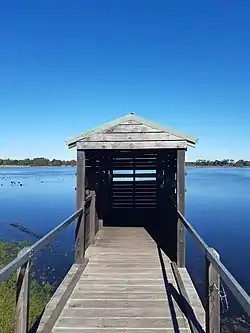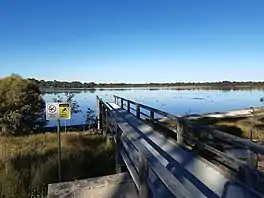| Beeliar Regional Park | |
|---|---|
 | |
| Type | Regional park |
| Location | CockburnKwinanaMelville |
| Coordinates | 32°10′03″S 115°49′57″E / 32.16750°S 115.83250°E |
| Area | 3,171 ha (7,840 acres) |
| Established | 17 January 1995 |
| Administered by | Department of Biodiversity, Conservation and Attractions |
| Website | parks |
| Official name | Beeliar Regional Park |
| Type | Interim list (Natural) |
| Designated | 24 June 1997 |
| Reference no. | 14862 |
Beeliar Regional Park is a conservation park approximately 19 kilometres (12 mi) south of the central business district in Perth, Western Australia, located within the Citys of Cockburn, Kwinana and Melville. The regional park is named after the indigenous Beeliar people of the area.
In Western Australia, regional parks consist of areas of land that have been identified as having outstanding conservation, landscape and recreation values. The park contains remnants of the Beeliar Wetlands, part of the once widespread Swan Coastal Plain.
Beeliar is one of eleven regional parks in the Perth region of Western Australia. The purpose of these regional parks is to serve as urban havens to preserve and restore cultural heritage and valuable ecosystems as well as to encourage sustainable nature-based recreation activities.[1]
History
The concept of regional spaces in Western Australia open to the public was first proposed in 1955, when the Stephenson-Hepburn Report recommended preserving private land for future public use in what would become the Perth Metropolitan Region in 1963. The Environmental Protection Authority (EPA) identified areas of significant conservation, landscape and recreation value in a report in 1983. In 1989, the state Government allocated the responsibility of managing regional parks to the Department of Conservation and Land Management.[2]
A Regional Parks Taskforce was established in 1990 but the EPA reported in 1993 that the establishment of these parks encountered difficulties.[2] Beeliar Regional Park was gazetted in the Government Gazette on 17 January 1995.[3]
Cultural heritage
The area of the Beeliar Regional Park, with its freshwater lakes, was an important camping area and source of food for the Beeliar clan of the Whadjuk people from the Noongar nation. A major trade route connecting the Swan and Murray River passed through the wetlands of what is now Beeliar Regional Park. A number of Aboriginal heritage sites have been identified within the park and the area continues to be of spiritual importance to the local indigenous people.[4]
European settlement of the area was slow because large tracts of land in the area were unsuitable for farming and initial attempts to establish a town in the 1830s failed. By the 1920s, an extensive network of canals had been constructed to drain the wetlands for agricultural use.[4]
Areas
Beeliar Regional Park stretches from its northern-most point, Blue Gum Lake, 10 kilometres (6.2 mi) south of the CBD, to its southern extension, The Spectacles, 33 kilometres (21 mi) south of the CBD. It consists of 19 lakes, arranged in two chains. The smaller, western one is within 2 kilometres (1.2 mi) of the coast while the eastern, larger one is between 5 and 6 kilometres (3.1 and 3.7 mi) from the coast. The park also contains the Henderson coastal limestone cliffs.[4]
Eastern chain
The main areas from north to south:[4]
Western chain
The main areas from north to south:[4]
| Image | Name | Suburb | Description | Co-ordinates |
|---|---|---|---|---|
 |
Manning Lake | Hamilton HillSpearwood | Site of the heritage listed Azelia Ley Homestead | 32°05′33″S 115°46′19″E / 32.0925°S 115.7719°E |
 |
Market Garden Swamp 1 | Spearwood | 32°06′44″S 115°46′44″E / 32.112294°S 115.778963°E | |
 |
Market Garden Swamp 2 | Lake Coogee | 32°07′30″S 115°46′49″E / 32.125030°S 115.780264°E | |
 |
Lake Coogee | Lake Coogee | 32°08′06″S 115°46′36″E / 32.1350°S 115.7767°E | |
| Brownman Swamps | Henderson | 32°09′54″S 115°47′14″E / 32.165128°S 115.787342°E | ||
 |
Lake Mount Brown | Henderson | 32°10′24″S 115°47′23″E / 32.173333°S 115.789833°E | |
 |
Mount Brown | Henderson &Naval Base | Contains a lookout with views of the surrounding areas and Cockburn Sound | 32°10′54″S 115°47′00″E / 32.1817°S 115.7833°E |
 |
Henderson Foreshore | Henderson &Naval Base | Contains a lookout and a short cliff top walkOffers views of Garden Island and Carnac Island | 32°10′24″S 115°46′20″E / 32.173330°S 115.772125°E |
References
- ↑ "National, marine and regional parks in Western Australia" (PDF). Department of Parks and Wildlife. June 2017. Archived from the original (PDF) on 2 June 2021. Retrieved 28 May 2021.
- 1 2 Rockingham Lakes Regional Park Management Plan 2010 (PDF) (Report). Conservation Commission of Western Australia, Department of Environment and Conservation & City of Rockingham. 2010. Retrieved 28 May 2021.
- ↑ "Beeliar Regional Park and Adjacent Areas, Beeliar Dr, Beeliar, WA, Australia". Australian Heritage Database. Retrieved 28 May 2021.
- 1 2 3 4 5 Beeliar Regional Park Final Management Plan 2006 (PDF) (Report). Department of Conservation and Land Management. 2006. Retrieved 28 May 2021.
External links
- Parks and Wildlife Service: Beeliar Regional Park
- Urban Bushland Council WA Inc.: Beeliar Regional Park








